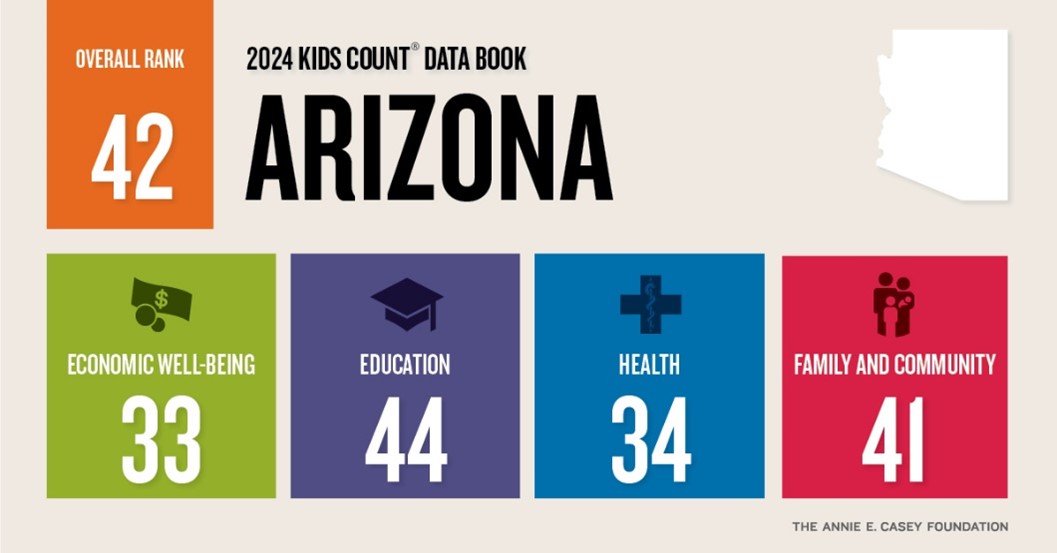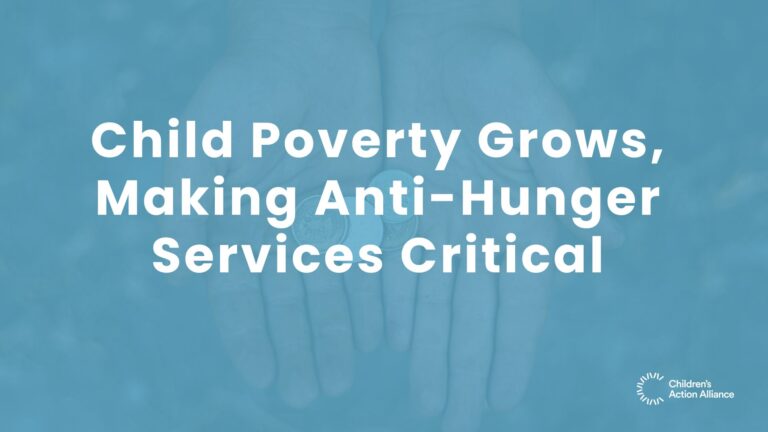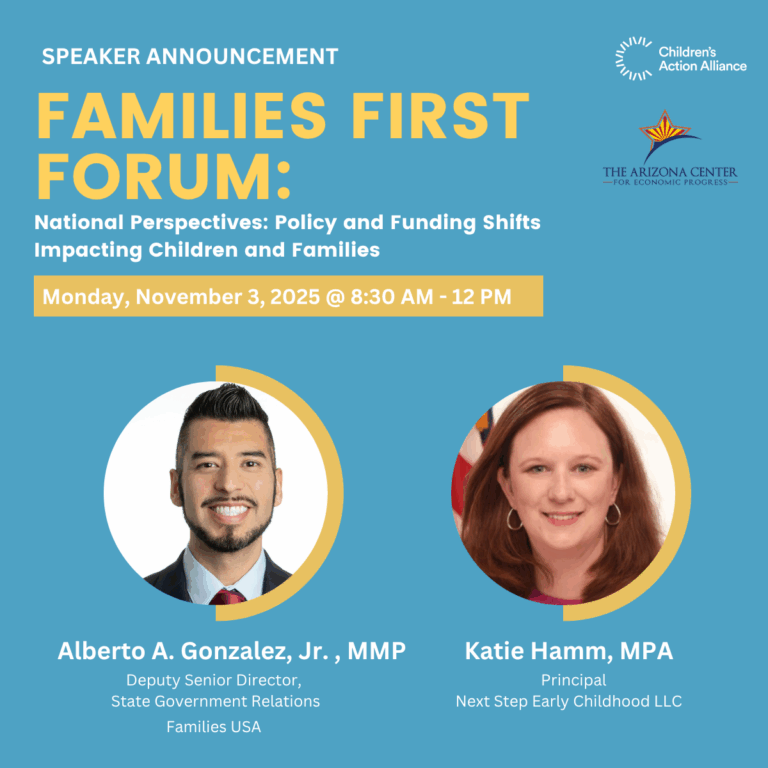
Children in Arizona and their Well-Being
Read Report - 2024 KIDS COUNT® Data Book
Check out ABC15's article on the report, here.
Children’s Action Alliance works in partnership with people like you every day to improve the well-being of children. Now, the annual data is out to help us know how their well-being has improved - and how it hasn’t.
This year, Arizona ranks 42nd in child well-being according to the 2024 KIDS COUNT® Data Book, which is down from last year’s 39th ranking. This means Arizona has sunk back down into the bottom ten states in the country. As we look at the data, there is both discouraging and encouraging news.
- Economic well-being: Arizona ranks 33rd.
- Education: Arizona ranks 44th.
- Health: Arizona ranks 34th.
- Family and community: Arizona ranks 41st.
Key Findings of the 2024 KIDS COUNT® Data Book and Their Impact:
- About 40% of children in the U.S. have faced at least one adverse childhood experience (ACE). In Arizona, this number is slightly higher at 43%.
- High housing costs remain a challenge for families. In 2022, 29% of children in Arizona lived in households with a high housing cost burden, which is a greater share than the last report. This especially matters to students considering that housing instability has been found to be a predictor of chronic absenteeism.
- Child care and preschool continue to be out of access to many families. In Arizona, young children (ages 3 and 4) not in school grew to 65% from the previous share of 62%. A recent Arizona survey found that 42% of working parents reduced work hours due to child care issues. Lack of access to affordable childcare increases the risk of parental stress and maternal depression, which is a specific ACEs risk factor for children. When parents can’t afford child care, it impacts parents, children, and the economy.
- The share of children who lack health insurance has improved from 9% to 8%, which acknowledges policymakers working to protect health coverage for children.
- One of the hardest hitting findings is that the share of child and teen deaths in Arizona has increased by 5% and is above the national rate.
The data tells us that we must work together to help children in Arizona thrive and, when we do, that collaboration can make a difference. Supporting families and children as they struggle with rising costs such unaffordable housing and child care costs is an urgent issue in need of solutions. Children’s Action Alliance recommends federal, state, and local governments:
- Advance policies that strengthen household financial security, including accessible child care, affordable housing, temporary financial assistance, and food assistance. Regarding children, the CDC reports that prevention of ACEs can be supported by policies that increase economic stability, decrease parental stress, and improve parents’ ability to meet children’s basic needs and obtain high-quality child care.
- Protect health insurance for children, including through the private market, the Arizona Health Care Cost Containment System Medicaid plans, and KidsCare. A recent expansion of KidsCare is an encouraging bipartisan action that results in thousands more children gaining coverage.
- Invest in child care now to lower costs and reduce the disruption that will be caused by the looming child care funding cliff.
- The Arizona Legislature and Governor Katie Hobbs should dedicate state general funds to child care to support Arizona’s children, parents, providers, and economy, as proposed in Governor Hobbs’Executive Budget. Investment of significant public funding is an urgent priority for child care accessibility as child care providers already operate on thin margins and childcare workers receive very low wages.
- The federal government should continue to increase funding for the nation’s child care infrastructure, including child care and Head Start, and take actions to increase affordability, such as their recent proposed regulation.
Supporting students in need of mental health services and trauma-informed support is a critical need that Arizona has begun to address and must continue to do so. Children’s Action Alliance recommends that policymakers:
- Invest in public schools and community schools to become trauma-informed and provide wraparound support to kids and families. Investment is needed for schools to better support student learning, attendance, and well-being through trauma-informed school Schools can improve student outcomes with investments in tutoring, mental health support, nutritional assistance, and other services, including multi-cultural and multi-lingual parent engagement.
- Continue to build pathways for students to access mental health services through school. In 2020, the Arizona Legislature passed Jake’s Law, which created the Children’s Behavioral Health Fund to allow uninsured and underinsured children to receive services through schools and AHCCCS health plans. More actions such as these are needed in sustainable ways, including more school counselors, on-site services provided by AHCCCS health plans, and continued expansion of authority for schools to directly bill AHCCCS for all Medicaid-covered health services.
Read Report - 2024 KIDS COUNT® Data Book



